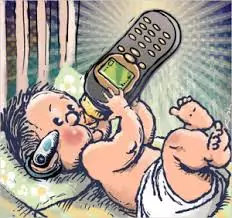 Humans in ancient times used to believe in magic as a way of shaping and transforming the surrounding reality according to the will and intention of the practitioner. Shamans, exorcists, and priests all around the globe had summoned rains and spirits, cured wounds and cursed enemies. Today, people are more rational and pragmatic, and magic in our world remains intact only in books. However, humanity has found a much more effective substitute for this mystical discipline, and this substitute is technology. Magic was for the chosen few—technology is for everyone. People praise technologies claiming that they allow them to save time and lives, and that they make their lives easier. But are technologies beneficial for humankind?
Humans in ancient times used to believe in magic as a way of shaping and transforming the surrounding reality according to the will and intention of the practitioner. Shamans, exorcists, and priests all around the globe had summoned rains and spirits, cured wounds and cursed enemies. Today, people are more rational and pragmatic, and magic in our world remains intact only in books. However, humanity has found a much more effective substitute for this mystical discipline, and this substitute is technology. Magic was for the chosen few—technology is for everyone. People praise technologies claiming that they allow them to save time and lives, and that they make their lives easier. But are technologies beneficial for humankind?

✅ AI Essay Writer ✅ AI Detector ✅ Plagchecker ✅ Paraphraser
✅ Summarizer ✅ Citation Generator
The foremost argument of the proponents of the point of view that technologies are beneficial is that they allow people to save their personal time. To some extent, they are right, because housewives today do not need to spend whole days cooking or doing laundry; it usually takes them a couple of hours, due to washing machines, electric ovens, dishwashing machines, vacuum cleaners, and other appliances. However, we can take a look at this claim from another perspective, and ask ourselves: but what do people do with all this free time? The answer can be disappointing. According to research, in 2010, Americans spent an average of 13 hours per week online (Newser), consuming 16 minutes on social networks for every hour online. In 2012, watching TV for about 34 hours a week was also a common index for USA citizens over the age of two. For elderly people, the average index is 48 hours a week (NY Daily News). It can be implied that TV and social networks, which are also products of technologies, distract people from self-development, culture, physical activities, and live communication.
People became dependent on technologies; at the same time, people often have no idea how these technologies work. Stated succinctly, technology is still a kind of magic. If a business owner finds his cellphone broken, he or she is helpless, as he or she cannot fix it or perform his or her functions without it. If a person’s car does not start, they will most likely not be able to take a look at the engine and fix the problem. If electricity is completely out for at least a week (including all possible reserve systems, as well as atomic and wind sources of energy), our social, economic, and political systems will collapse.
Technologies constantly advance. Every day, manufacturers the world over introduce technological novelties, which, as they claim, are better and more effective than their previous analogues. New appliances and gadgets usually cost more; for an example, one needs to look no further than any smartphone or tablet of an older and newer model. Commercials, advertisements, public opinions, and personal cravings motivate individuals to seek ways to purchase technological novelties despite the lack of finances or the absence of intelligible need. For example, Wang Shangkun, a Chinese student, had sold his kidney to purchase a new model of the iPad tablet in 2012 (Telegraph). Unfortunately, his case is not unique. On the other hand, the inability to buy new gadgets can cause severe stress.
Technological progress today is what moves humankind forward. Many daily activities have become easier and more pleasant due to all kinds of appliances and gadgets. They can be of a great help, but at the same time, they can also cause harm to them. Technologies grant their users more free time, but cannot offer worthy activities, thus making people spend their free time online or watching TV. People have become extremely dependent on technologies, but often have no idea how they work. In addition, due to advertising and public opinion, people feel obliged to spend excessive amounts money to purchase newer appliances, and can experience stress in case of the inability to do so.
References
McMaster, Nick. “Americans Spend Equal Time Online, Watching TV.” Newser. N.p., 14 Dec. 2010. Web. 02 July 2013.
Hinckley, David. “Americans Spend 34 Hours a Week Watching TV, according to Nielsen Numbers.” NY Daily News. N.p., 19 Sept. 2012. Web. 02 July 2013.
“Chinese Student Sells Kidney for iPad.” The Telegraph. N.p., 10 Aug. 2012. Web. 2 July 2013.
Follow us on Reddit for more insights and updates.





Comments (0)
Welcome to A*Help comments!
We’re all about debate and discussion at A*Help.
We value the diverse opinions of users, so you may find points of view that you don’t agree with. And that’s cool. However, there are certain things we’re not OK with: attempts to manipulate our data in any way, for example, or the posting of discriminative, offensive, hateful, or disparaging material.
Comments are closed.